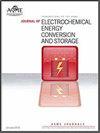Experimental and Theoretical Analysis of Immersion Cooling of a Li-Ion Battery Module
IF 1.9
4区 工程技术
Q3 ELECTROCHEMISTRY
Journal of Electrochemical Energy Conversion and Storage
Pub Date : 2023-10-27
DOI:10.1115/1.4063914
引用次数: 0
Abstract
Abstract Overheating of Li-ion cells and battery packs is an ongoing technological problem for electrochemical energy conversion and storage devices and systems, including in electric vehicles. Immersion cooling is a promising thermal management technique to address these challenges. This work presents experimental and theoretical analysis of the thermal and electrochemical impact of immersion cooling of a small module of Li-ion cells. Significant reduction in both surface and core temperature due to immersion cooling is observed, consistent with theoretical and simulation models developed here. However, immersion cooling is also found to result in a small but non-negligible increase in capacity fade of the cells. A number of hypotheses are formed and systematically tested through comparison of experimental measurements with theoretical modeling and simulations. Electrochemical Impedance Spectroscopy measurements indicate that the accelerated cell aging due to immersion cooling is likely to be due to enhanced lithium plating. Therefore, careful consideration of the impact of immersion cooling on long-term performance may be necessary. The results presented in this work quantify both thermal and electrochemical impacts of an important thermal management technique for Li-ion cells. These results may be of relevance for design and optimization of electrochemical energy conversion and storage systems.锂离子电池模块浸没冷却的实验与理论分析
锂离子电池和电池组的过热是电化学能量转换和存储设备和系统(包括电动汽车)持续存在的技术问题。浸入式冷却是一种很有前途的热管理技术,可以解决这些挑战。本文对小型锂离子电池模块浸入式冷却的热学和电化学影响进行了实验和理论分析。由于浸入式冷却,观察到表面和堆芯温度显著降低,这与这里开发的理论和模拟模型一致。然而,浸没冷却也会导致电池容量衰减的微小但不可忽略的增加。通过实验测量与理论建模和模拟的比较,形成并系统地验证了许多假设。电化学阻抗谱测量表明,浸没冷却导致的电池加速老化可能是由于强化的锂镀层。因此,仔细考虑浸没冷却对长期性能的影响可能是必要的。在这项工作中提出的结果量化了锂离子电池的重要热管理技术的热和电化学影响。这些结果对电化学能量转换和存储系统的设计和优化具有一定的指导意义。
本文章由计算机程序翻译,如有差异,请以英文原文为准。
求助全文
约1分钟内获得全文
求助全文
来源期刊

Journal of Electrochemical Energy Conversion and Storage
Engineering-Mechanics of Materials
CiteScore
4.90
自引率
4.00%
发文量
69
期刊介绍:
The Journal of Electrochemical Energy Conversion and Storage focuses on processes, components, devices and systems that store and convert electrical and chemical energy. This journal publishes peer-reviewed archival scholarly articles, research papers, technical briefs, review articles, perspective articles, and special volumes. Specific areas of interest include electrochemical engineering, electrocatalysis, novel materials, analysis and design of components, devices, and systems, balance of plant, novel numerical and analytical simulations, advanced materials characterization, innovative material synthesis and manufacturing methods, thermal management, reliability, durability, and damage tolerance.
 求助内容:
求助内容: 应助结果提醒方式:
应助结果提醒方式:


